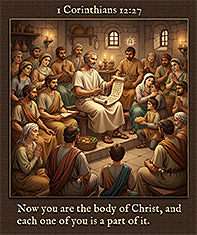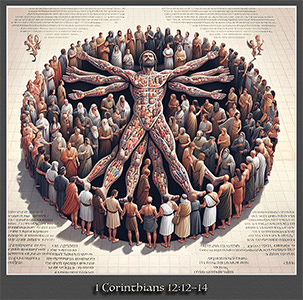First Corinthians 12:12–31 . . .
Receiving One Another’s Gifts
Did you know that God is interested in bodybuilding? He wants to build every muscle in his church; he doesn’t want there to be any superior or inferior body parts; he wants everyone and everything to be symmetrical with no undeveloped or lagging parts. God expects every part of the body to grow and do its work.
Paul discusses the importance of church teamwork in today’s passage, informing us that everybody is somebody because we’re in this bodybuilding effort together. Here he gives four specific directions for believers to take.
1) Appreciate the solidarity of the church body — 12:12–13 (see this passage at the bottom of the page). These first two verses give the theological basis for the body imagery that we’ll see in the rest of this passage. Paul states that every part of the body is essential, because every believer is a member of the church. The word “body,” introduced in v. 12, is repeated sixteen more times in this chapter while the word “one” occurs five times in vv. 12–13. Hence, the emphasis is on unity and oneness of the church body, which he refers to as Christ. Today, our body of many members is unified in one body.
In v. 13, Paul gives the reason for the church’s oneness: We’ve all been placed into the body of Christ. Paul argues that every Christian has experienced Spirit baptism, where the Holy Spirit baptizes the believer into the body of Christ, making us a part of his church. This passage teaches us that feelings of inferiority and superiority are out of bounds in Christ’s church. Everybody is somebody, because we’re all in this together.
2) Don’t underestimate your importance to the body of Christ (vv. 14–20) In a somewhat light-hearted vein, Apostle Paul attempts to get his two-part point across: (1) every member of the body has a different role to play and (2) all of these parts are needed for the body to function as a unit. In vv. 15–16, he infers a feeling of insignificance: No one thinks that I’m important or significant. I have little to contribute to this ministry. I don’t really matter to this church. For example, if your feet and their muscles aren’t working well, you won’t get very far. Feet are awfully important. So why should the foot say, I’m insignificant; I don’t count. No! God rewards the foot based on it being the foot, expecting you to do what you can with what you have. Similarly, the ear feels inferior to the eye but shouldn’t.
Unfortunately, some at Corinth who lacked the spectacular gifts that others had were discouraged and began to ask whether they had a place or function in the church. Paul then moves from the sublime to the ridiculous by envisioning an absurd scenario in v. 17 about the entire body becoming an eye or an ear. His point is this: Individually and collectively, we need each gift for the body of Christ to function. In vv. 18–20, Paul emphasizes that God is the one who has gifted every church the way he wants it gifted.
Beginning at v. 21 is a transition from those who feel inferior in their gifts to those who feel superior. Therein, we see church members who suffer from a superiority complex.
3) Don’t overestimate your importance to the body of Christ (vv. 21–26) Because every member needs one another, Paul explains that we need to squash spiritual pride. Writing, “The eye cannot say to the hand, ‘I don’t need you!’ And the head cannot say to the feet, ‘I don’t need you!’” He seems to be getting closer to the difficult issue being faced in Corinth: pride. Throughout this letter, pride was a significant problem among the Corinthians. So, Paul needed to get across the point that all of the members in Corinth need each other. In vv. 22–25, he continues his rebuke, arguing that every member of every church body is necessary, without exception! Those body parts that are deemed weaker, less honorable, or less presentable are, nevertheless, all critically important to the body.
In v. 26, Paul gives us a most powerful verse: “If one part suffers, every part suffers with it; if one part is honored, every part rejoices with it.” Taking the mutual care theme a step further, he highlights the fact that, as members of the same body, we’re so closely bound together that we actually share the same feelings; what causes joy for one member delights the whole body; when one member suffers, the entire body hurts. As a result, we must collectively yearn for the success of others.
Warren’s AI-generated image

Click to enlarge and download this
“Church Body” painting from
1 Corinthians 12:27.
4) Celebrate the diversity of the body (vv. 27–31) Here, Paul takes the analogy of the physical body and applies it practically in terms of gifting, listing eight kinds of members with special functions. The ranking of the first three functions (a.k.a. ministries) corresponds to their importance at building up the local church.
Paul closes this passage by asking questions about this list of gifts that he put in a descending order of priority. He expects a negative answer to all seven questions. His point is that it would be ridiculous for everyone to have the same gift; variety is essential. It’s wrong to equate one gift, particularly speaking in tongues, with spirituality, because all of the Corinthian church believers had been baptized by the Spirit (v. 13), but not all of them spoke in tongues (v. 30). Thus, Paul deals a deathblow to the theory that speaking in tongues designates a more intimate and active possession of the Spirit, because the answer “No” is expected for each question.
Paul’s final words are found in v. 31: “Now eagerly desire the greater gifts. And yet I will show you the most excellent way.” The command to “eagerly desire the greater gifts” isn’t addressed to the individual but to the collective church. Paul’s bottom line for us could be summed up accordingly: Every one of us believers needs to discover our significant spiritual gift(s) and use it to serve in the most fruitful way possible.
Note: 1st Corinthians challenges believers to examine every aspect of their lives through the lens of the Gospel. In chapters 11–14, Paul presents these four challenges:
Covering the head in worship (ch. 11) | Concerning spiritual gifts (ch. 12)
The supremacy of love (ch. 13) | Intelligibility in worship (ch. 14)
› Watch BibleProject’s superb animated video (2 minutes) that highlights Paul’s messages in these four chapters.
† Summary of 1 Corinthians 12:12–31
Today’s passage expands on Paul’s teaching about spiritual gifts, focusing on the unity and diversity within the body of Christ. Here’s my summary of the key points regarding receiving one another’s gifts:
• The Body of Christ Metaphor
Paul uses the metaphor of a human body to illustrate the church:
† Just as a body has many parts but is one, so is Christ’s body (the church).
† All believers are baptized by one Spirit into one body.
† The body isn’t made up of one part but many.
• Diversity of Gifts
Next, Paul emphasizes the importance of diversity within the church:
† Different parts (members) have different functions.
† Each part is necessary for the proper functioning of the whole.
† God has arranged the parts in the body as he wanted them to be arranged.
• Interdependence of Members
The passage stresses mutual need and care among church members:
† No part can say to another, I don’t need you.
† The seemingly weaker parts are indispensable.
† God gives greater honor to the parts that lack it.
• Unity in Diversity
Paul calls for unity, despite the diversity of gifts:
† There should be no division in the body.
† Members should have equal concern for each other.
† If one part suffers, all parts suffer; if one part is honored, all rejoice (v. 26).
• Hierarchy of Gifts
Finally, Paul lists various roles and gifts in the church, implying a certain order:
† Apostles, prophets, teachers, miracles, healing, helping, administration, tongues
Seeking Gifts The passage concludes with an exhortation to eagerly desire and pursue the greater gifts, leading into Paul’s next teaching, in chapter 13, on love.
This passage emphasizes the importance of recognizing, valuing, and receiving the diverse gifts of all members in the body of Christ, promoting unity and mutual care within the church community.
- Q. 1 Do you know the gift(s) that you’ve been given (vv. 14–20)? How well do you believe you’re using your gift(s)? Are you envious of other people’s gifts and talents?
- Q. 2 Are you prideful about the gifts that God has given you (vv. 21–26)? Do you look down on others who have different gifts? Have you confessed your pride in this area?
- Q. 3 How do you feel about other church members who don’t appear to use a gift received of the Spirit? Have you considered discussing spiritual giftedness with them in an effort to help encourage them?
1 Corinthians 12:12–31
New International Version (NIV)
[You can view it in a different version by clicking here; you can also listen to this chapter.]
Unity and Diversity in the Body
12Just as a body, though one, has many parts, but all its many parts form one body, so it is with Christ. 13For we were all baptized by one Spirit so as to form one body—whether Jews or Gentiles, slave or free—and we were all given the one Spirit to drink. 14Even so the body is not made up of one part but of many.
15Now if the foot should say, “Because I am not a hand, I do not belong to the body,” it would not for that reason stop being part of the body. 16And if the ear should say, “Because I am not an eye, I do not belong to the body,” it would not for that reason stop being part of the body. 17If the whole body were an eye, where would the sense of hearing be? If the whole body were an ear, where would the sense of smell be? 18But in fact God has placed the parts in the body, every one of them, just as he wanted them to be. 19If they were all one part, where would the body be? 20As it is, there are many parts, but one body.
21The eye cannot say to the hand, “I don’t need you!” And the head cannot say to the feet, “I don’t need you!” 22On the contrary, those parts of the body that seem to be weaker are indispensable, 23and the parts that we think are less honorable we treat with special honor. And the parts that are unpresentable are treated with special modesty, 24while our presentable parts need no special treatment. But God has put the body together, giving greater honor to the parts that lacked it, 25so that there should be no division in the body, but that its parts should have equal concern for each other. 26If one part suffers, every part suffers with it; if one part is honored, every part rejoices with it.
27Now you are the body of Christ, and each one of you is a part of it. 28And God has placed in the church first of all apostles, second prophets, third teachers, then miracles, then gifts of healing, of helping, of guidance, and of different kinds of tongues. 29Are all apostles? Are all prophets? Are all teachers? Do all work miracles? 30Do all have gifts of healing? Do all speak in tongues? Do all interpret? 31Now eagerly desire the greater gifts.
Love Is Indispensable
And yet I will show you the most excellent way.

